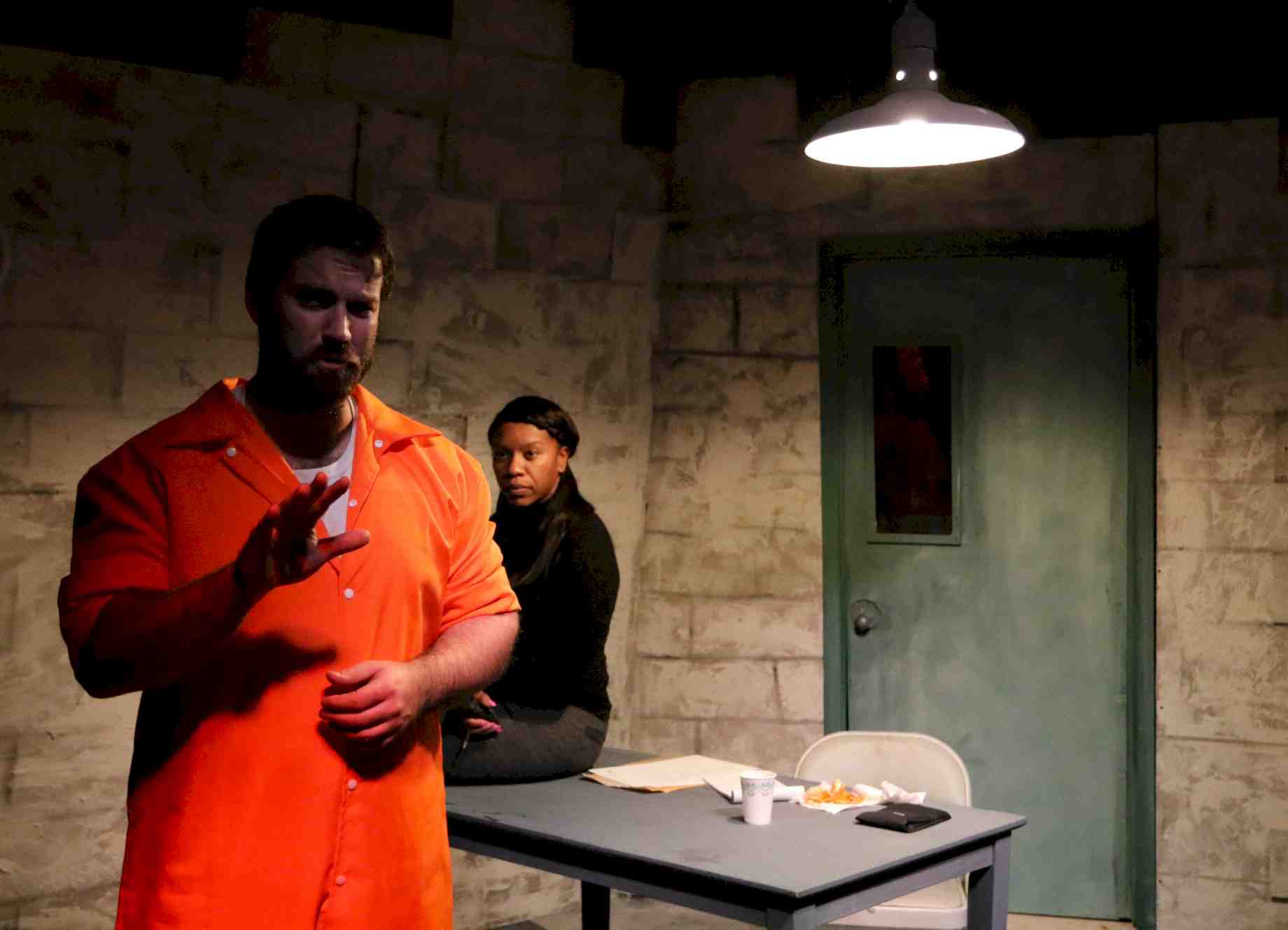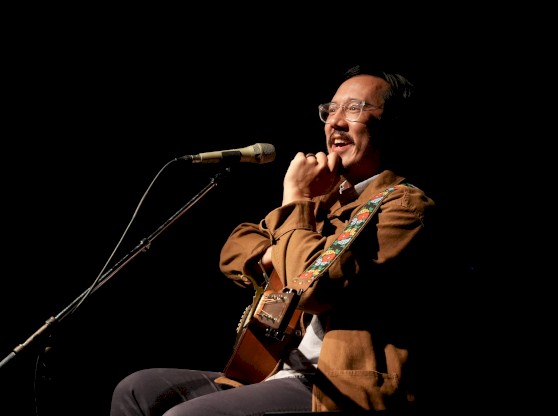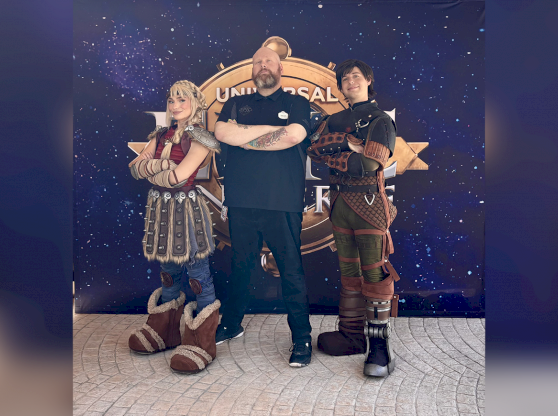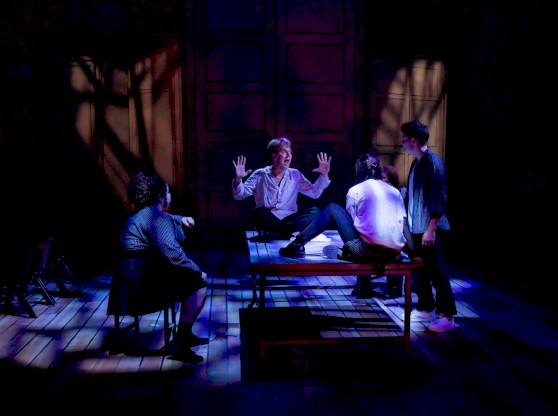With a strong interest in creating art for activism, third-year MFA acting candidate Andy Prescott stepped into the role of Rick in the UF Center for Arts in Medicine’s production of Building the Wall. Written just weeks after President Donald J. Trump was elected into office, Robert Schennkan’s Building the Wall takes place two years into Trump’s presidency, and focuses on Rick, a man who has become a prisoner of the rhetoric he once supported. Awaiting trial for the atrocities that he allowed to happen under his watch, Rick is visited by Gloria, a historian played by UF alumna Brittney M. Caldwell (MFA Acting ‘18), who has come in search of the truth, soon to find out that the unthinkable has become reality.
Andy Prescott and director Jeff Pufahl, lecturer in the Center for Arts in Medicine, presented this play in collaboration with a number of community stakeholders and local organizations. The show collected $700 in ticket sales, which was donated to The Human Rights Coalition’s Community ID Drive, a program that “provides card holders with a reliable form of identification that can be used as a tool by law enforcement, city departments, health centers, schools, businesses, and cultural arts organizations to better identify, serve, and protect us.”
Noa: This show is clearly very topical and politically charged. What was the general audience response? Were you surprised by this response?
Andy: You know I get goosebumps just thinking about seeing some of the faces and then a lot of people brought forth kind of their own narratives, some of their own initiatives that they’ve seen around town. There were a lot of people that needed to breathe, and actually we started leading people in kind of a collective inhale and exhale to just release some of these things. The final show that I did was a crushing show to do, producing and acting in it, and some people had tears. Some people were hugging me and saying ‘thank you.’
Noa: This show was written only weeks after Trump’s election as a prediction of what was to come. What is like to perform in the show two years later having the advantage of seeing how this administration is playing out?
Andy: It was crazy that the context of the play was shifting as we were working on it. It’s doing your homework, doing your research knowing what actually happened within the events of the play, and then what was sort of completely fabricated. The terrorist attack that they mention that happens in New York didn’t actually happen, but the mass round up of undocumented people did. But to do it in 2019, it still holds. It still holds because a lot of what people got from the play is remembering that it’s still happening. There hasn’t been a reintegration of people into society. They’re still in prison.
Noa: You mentioned that you served as a producer on this show as well as an actor in it. What was it like to be involved on the stage and behind the scenes?
Andy: It was my baby. I put blood, sweat and tears into it. I was making sure that I wasn’t doing a play just to do a play. I wanted it to be more, and so that is where I found the cross sections between arts and public health. I’ve done homework for roles every time because that is what you are trained to do, but this was even more in depth. You think about the complex layers that can be in a character like that, and it kind of breaks you a little bit. If anyone asked me a question about the play, I had no problem answering it wearing my producer hat or my actor hat, and it definitely informed more of an investment, emotionally, with the real stuff that is happening.
Noa: What is one thing you hope people take away from this show?
Andy: That this is a crisis. This is horrific. If you saw the play, and it scared you a little bit, then it should. Inadvertently, our heads are in the sand about what is really happening. Listen to these stories. Listen to what is being said. They are not making this up. They are not fabricating these stories. These are people that are living hardships. There is more than just sending prayers. If you can, just put in a few hours of your own time, and open your heart, your time and your privilege.
Noa: Why are works of art and shows like this important in today’s world?
Andy: It’s really just informing. Not to say ‘Shame on you,’ but to say, ‘Hey, if you can, help us out.’
So, seeing a play like this, it helps to not only just see the play, but then reflect upon it and after go, ‘Alright what can we do?’ It was making sure that the resources were there, that if there was an ‘act hunger,’ that they were redirected to a cause that they can support. There is a reason why all of these organizations exist. They are there to help people that are being hurt by the things that this administration has kind of furthered. And we’ve taken a few steps back.
Noa: The $700 this show raised through ticket sales was donated to Alachua County’s Human Rights Coalition community ID program. What was it like to create art that has such a direct impact on the community?
Andy: People don’t realize what an ID is and what it can do for you until you don’t have it. It makes it impossible to function as a normal person. Essentially, if you were to take that $700, each ID cost $10, so 70 undocumented people are getting their IDs because of what we did with this play and the talk back. I was happy to give that money order to [them].
Noa: What message was important for you to get across while performing in this show?
Andy: I’ll preface this by saying that as a producer and talking with Jeff, we wanted to make sure that we weren’t preaching to a choir. It was our goal to see who we can bring in from both sides. I would say a majority were sort of the choir that we were preaching to but there were some people who did stick around and had something to say. Nothing malicious or anything, but the idea is to inspire a sense of empathy with this, and because [the play] holds true to this day, inspiring people to really look up and be like, ‘What is actually happening?’
Building the Wall was presented by the UF Center for Arts in Medicine in partnership with the Civic Media Center, Veterans for Peace, Welcoming Gainesville, Chispas, UF Democrats, Speech and Debate Society, The Human Rights Coalition, Rural Women’s Health Project, and Madres sin Fronteras.



